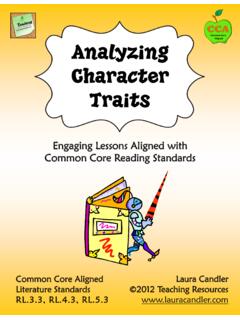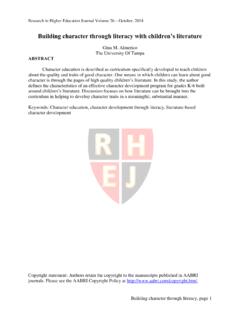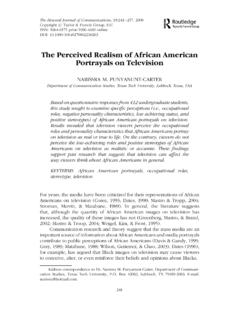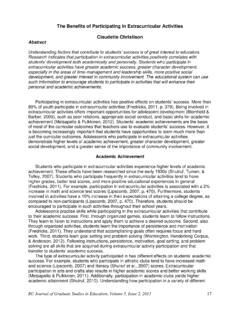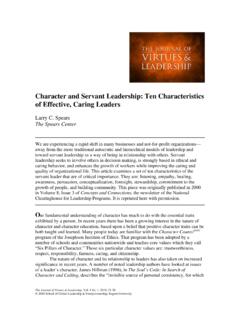Transcription of Character education framework guidance - GOV.UK
1 Character education framework guidance November 2019 2 Contents Summary 3 Expiry or review date 3 Who is this publication for? 3 Background 4 The Six Character Benchmarks 4 The Definitions of Character 6 Rationale for the benchmarks 8 Equality 10 Next Steps 10 Annex A where to get help 12 Annex B case studies 19 3 Summary 1. This document is new non-statutory guidance to schools1 on Character education and development for pupils. 2. This guidance is based on recommendations from the advisory group on Character established in April 2019, chaired by Ian Bauckham CBE and with members including headteachers and the leaders of teaching trade unions NAHT and ASCL. The group s recommendations draw on a written call for evidence held between 27 May and 5 July 2019 and a series of meetings with stakeholders, including teachers, headteachers, parents, voluntary sector organisations, businesses, and young people themselves. Expiry or review date 3.
2 This guidance is due to be reviewed in November 2020. Who is this publication for? 4. It is intended for use by school leaders and teachers when considering the rationale for Character education and some wider aspects of personal development, and the practicalities of provision and delivery. 1 References to schools mean all publicly-funded schools including academies and free schools, Pupil Referral Units, alternative provision settings, special schools and privately-funded independent schools. 4 Background 5. education for Character is already integral to the work of excellent schools. In these schools there is no tension between a rigorous and stretching academic education on the one hand and outstanding wider personal development on the other. Indeed, these and other aspects of the school s work all contribute to forming well-educated and rounded young adults ready to take their place in the world. 6. Schools have a statutory duty, as part of a broad and balanced curriculum, to promote the spiritual, moral, social, and cultural (SMSC) development of pupils and prepare them for the opportunities, responsibilities and experiences of later life2.
3 Character education contributes to this duty to promote SMSC. The duty applies to academies and free schools through the Independent School Standards. 7. The Relationships, Sex and Health education Statutory guidance (which applies to all state funded schools) makes clear that this is most effective when schools also actively promote good behaviour and positive Character traits, including for example courtesy, respect, truthfulness, courage and generosity. 8. Schools have an important role in the fostering of good mental wellbeing among young people so that they can fulfil their potential at school and are well prepared for adult life. Schools with clear expectations on behaviour and with well-planned provision for Character and personal development can help promote good mental wellbeing. 9. From September 2019, Ofsted inspections recognise the importance of schools provision for Character education through its inclusion in the new judgement on Personal Development in all Section 5 and Section 8 inspections.
4 The Six Character Benchmarks 10. These benchmarks summarise the most important features of good provision for Character education and are intended to assist schools in evaluating their own work and planning for development. A. What kind of school are we? How clearly do we articulate the kind of education we aspire to provide? How do we ensure that all members of the school community ( staff, pupils, parents/carers, governing body) understand and share our aims? How effectively do we create a sense of pride, belonging and identity in our school? 2 Section 78 of the education Act 2002 5 B. What are our expectations of behaviour towards each other? Are we clear on the importance of discipline and good behaviour in school life? How do we promote this understanding? How well do we promote consideration and respect towards others (pupils and adults), good manners and courtesy? How well do we promote a range of positive Character traits among pupils?
5 C. How well do our curriculum and teaching develop resilience and confidence? Is our curriculum ambitious for our pupils? Does it teach knowledge and cultural capital which will open doors and give them confidence in wider society? Is our curriculum logically organised and sequenced, including within subjects, and taught using effective pedagogy, so pupils gain a strong sense of progress and grow in confidence? D. How good is our co-curriculum ? Does it cover a wide range across artistic, creative, performance, sporting, debating, challenge, team and individual etc. so all pupils can both discover new interests and develop existing ones? Do we make use of or promote local, national or international programmes or organisations? ( uniformed organisations, Duke of Edinburgh, National Citizen Service etc.) Is provision of high quality and does it challenge pupils and build expertise? Is participation sustained over time? Are there ample opportunities for pupils to compete, perform etc.
6 , and is success acknowledged and celebrated? E. How well do we promote the value of volunteering and service to others? Are age-appropriate expectations of volunteering and service to others clearly established? Are opportunities varied, meaningful, high-quality and sustained over time? Do volunteering and service opportunities contribute to breaking down social barriers? Are they effective in making pupils civic-minded and ready to contribute to society? 6 F. How do we ensure that all our pupils benefit equally from what we offer? Do we understand and reduce barriers to participation ( cost, timing, location, logistics, confidence, parental support etc.)? Do we enable young people from all backgrounds to feel as if they belong and are valued? Is our provision, including our co-curricular provision, appropriately tailored both to suit and to challenge the pupils we serve? 11. School leaders will want to consider Character education in the context of their own school against these benchmarks so that they can evaluate the nature and quality of their current provision and determine their aspirations for future development.
7 It is for individual schools or trusts to decide what constitutes good provision and to be accountable for it. It is important for school leaders to reflect on practice in their institutions and seek to develop and improve it as effectively as possible. 12. When considering these questions and the wider Character provision in schools, the capacity and work-life balance of school staff should be taken into account. The responsibilities and demands placed on staff need to be proportionate and should not lead to additional workload. Considerations of use of directed time, remuneration, personnel and resources should be made before embarking on any course of action. School leaders may wish to consider using the workload reduction toolkit to review current practices in their schools. The toolkit was developed by school leaders, teachers and other sector experts. It provides accessible materials, including practical advice, tools and case studies that school leaders, teachers and other staff can use to address workload issues in their school.
8 The Definitions of Character 13. Character education is not new. Schools in a survey by NatCen Social Research and the National Children s Bureau3 used a wide variety of curricular and extra-curricular activities to provide Character education , including: assemblies, subject lessons, dedicated Character education lessons, sports, performance arts clubs, outward bound activities, hobby clubs, and subject learning clubs. These opportunities help young people to explore and express their Character and build the skills they need for resilience, empathy and employability. 14. Character is a complex concept with a number of overlapping facets. We identified four important aspects, which can inform the way schools shape their wider provision for children and young people: 3 Research for the Department for education by NatCen Social Research and the National Children s Bureau: Developing Character Skills in Schools, August 2017 7 the ability to remain motivated by long-term goals, to see a link between effort in the present and pay-off in the longer-term, overcoming and persevering through, and learning from, setbacks when encountered; the learning and habituation of positive moral attributes, sometimes known as virtues , and including, for example, courage, honesty, generosity, integrity, humility and a sense of justice, alongside others; the acquisition of social confidence and the ability to make points or arguments clearly and constructively, listen attentively to the views of others, behave with courtesy and good manners and speak persuasively to an audience.
9 And an appreciation of the importance of long-term commitments which frame the successful and fulfilled life, for example to spouse, partner, role or vocation, the local community, to faith or world view. This helps individuals to put down deep roots and gives stability and longevity to lifetime endeavours. 15. Research suggests that there are enabling Character traits which can improve educational attainment, engagement with school and attendance. A literature review for the education Endowment Foundation and Cabinet Office found that: High self-efficacy, or self-belief, is associated with better performance, more persistence and greater interest in work; Highly motivated children (linked to tenacity) driven internally and not by extrinsic rewards show greater levels of persistence and achievement; Good self-control (or self-regulation, the ability to delay gratification) is associated with greater attainment levels; and Having good coping skills (part of being able to bounce back) is associated with greater well-being4.
10 16. Other studies have suggested that: schools which develop Character well help drive equity and social mobility for their pupils5. 4 The impact of non-cognitive skills on outcomes for young people, Leslie Morrison Gutman and Ingrid Schoon, Institute of education , 2013 5 Out of school activities during primary school and KS2 attainment, Jenny Chanfreau, Emily Tanner, Meg Callanan, Karen Laing, Amy Skipp and Liz Todd, Centre for Longitudinal studies , Working paper 2016/1, Institute for education , University College London 8 Access to Character development opportunities in schools can lead pupils that take part to be highly motivated6, report fewer absences7 and have lower levels of emotional distress8, amongst other outcomes. 17. The importance of Character education is reflected in Ofsted s inspection arrangements. As with other aspects of education , the best Character education does not happen by chance, but is the product of clear and purposeful leadership, a strong ethos and high expectations of pupils, a good curriculum and co-curriculum and strong evidence-based pedagogy.










